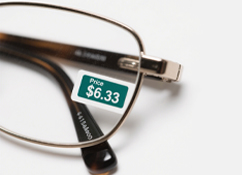Choosing Eyeglass Lenses: A Guide Based on Your Needs and Eye Health
Selecting eyeglass lenses depends on your visual needs and eye conditions. Resin lenses work for daily use, PC lenses excel in sports protection, glass lenses suit those with high prescriptions, progressive multifocal lenses are ideal for older adults, and blue-light-blocking lenses benefit heavy screen users. This guide breaks down each type’s features, pros, cons, and best uses to help you choose wisely.
1. Resin Lenses
Resin lenses are the most common type today, known for being lightweight, highly impact-resistant, and offering excellent light transmittance. They’re suitable for most people with myopia, hyperopia, or astigmatism—especially children and teenagers—for everyday wear.
Resin lenses can be coated with multiple layers, including anti-reflective, water-repellent, and anti-fouling coatings, which reduce glare and extend the lens life. However, they’re less scratch-resistant; over time, scratches may appear, requiring regular replacement.
2. PC Lenses
Made from polycarbonate, PC lenses (often called "space lenses" or "bulletproof lenses") boast extreme impact resistance. They’re perfect for people in high-intensity sports or high-risk jobs, such as athletes or construction workers.
PC lenses are even lighter than resin lenses but have a lower Abbe number, which may cause chromatic aberration and affect visual clarity. They typically require special coatings to boost surface hardness and prevent daily wear and tear.
3. Glass Lenses
Glass lenses offer superior optical performance and scratch resistance, making them a good fit for those with high myopia or hyperopia. They provide sharper vision, resist scratches, and have a longer lifespan.
However, glass lenses are heavy, leading to poor wearing comfort, and have low impact resistance—if they shatter, they could injure the eyes. With advances in resin lens technology, glass lenses have largely faded from mainstream use, reserved only for specific optical needs.
4. Progressive Multifocal Lenses
Designed specifically for presbyopia (age-related farsightedness), progressive multifocal lenses meet vision needs at far, medium, and near distances. The lens is divided into three zones from top to bottom: far vision, progressive transition, and near vision, eliminating the abrupt jump of traditional bifocal lenses.
These lenses require a longer adaptation period; initial wearers may experience dizziness or blurred vision. When choosing progressive lenses, pay attention to matching the channel length and add power. It’s best to get fitted under the guidance of a professional optometrist.
5. Blue-Light-Blocking Lenses
Blue-light-blocking lenses filter harmful blue light from electronic screens through special coatings or added materials. They’re ideal for people who use computers, phones, or other digital devices for long periods, helping reduce eye strain and dryness.
These lenses often have a faint yellow tint, which may slightly affect color perception. When choosing, check the blue-light blocking rate—too high (over 40%) can disrupt circadian rhythms, so aim for 20–40%.
Tips for Choosing Lenses
· Start with a comprehensive eye exam to determine your prescription and identify your visual habits before selecting a lens type.
· Maintain your lenses by cleaning them properly—avoid rough cloths that can scratch the surface.
· Update your lenses regularly (every 1–2 years) by rechecking your vision, as prescriptions can change.
· For high myopia or specialized job needs, consider custom lens solutions.
No matter which lens type you choose, proper fitting and adjustment are key to visual comfort. Always get your glasses fitted at a professional facility.











